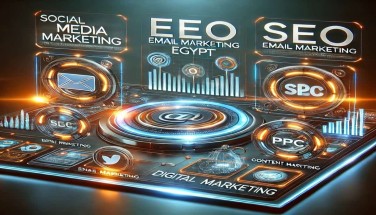What is SEO
What is SEO, its Benefits, and Why Is It the Magic Lamp for Marketing?
To answer the question "What is SEO and what are its benefits?", we need to acknowledge that in today's digital age, online marketing has become an essential necessity for all businesses and brands. One of the most important tools for online marketing, alongside managing social media accounts and platforms, is websites (e-commerce stores). To succeed in this field, there is a magical strategy that can help attract the targeted audience and increase sales, and this strategy is SEO (Search Engine Optimization). But what is SEO, what are its benefits, and how can it be like "Aladdin's lamp" for achieving marketing success?
What is SEO and What Are Its Benefits?
SEO stands for Search Engine Optimization, and it refers to a set of techniques and strategies aimed at improving the visibility of your website in organic (non-paid) search engine results, such as Google. When your site is optimized correctly using SEO, it increases the chances of your site appearing on the first pages of search results.
The benefits of SEO are numerous and have a significant impact on the performance of websites online. Here are the main benefits:
By understanding what SEO is and applying it effectively, or by hiring a digital marketing company, businesses can benefit from the following:
- Increase Organic Traffic: Without spending large budgets on Google Ads or social media ads, you can improve your site to appear in search engine results.
- Increase Trust and Credibility: When your site appears in top search results, users consider it more reliable.
- Improve User Experience: SEO isn't just about keywords; it also involves improving the site structure, loading speed, and mobile compatibility. Therefore, it is important to carefully choose a website design company.
- Increase Sales and Revenue: By improving SEO and attracting more targeted visitors, the chances of sales and revenue increase, especially if the site offers products or services for sale.
In short, SEO is a long-term investment that can significantly enhance your digital presence and achieve sustainable benefits. Therefore, it is crucial for everyone to understand what SEO is and how it can help increase success in a competitive market.
Common SEO Mistakes
Many companies make common mistakes when implementing SEO, such as:
- Keyword Stuffing: Overusing keywords unnaturally can negatively affect your site ranking.
- Ignoring Quality Content: Content is king, and providing high-quality content should be an essential part of any SEO strategy.
- Using Duplicate or Copied Content: To avoid these mistakes, you can rely on Rabeh, the best SEO company.
What Are the SEO Factors?
After understanding what SEO is and its benefits, we can explore the factors that help improve your site's ranking in search results. These factors can be divided into three main categories:
- On-Page SEO:
- Keywords: Choose relevant keywords for your site's content and place them appropriately in titles, descriptions, and text content without overuse.
- Content Quality: The content must be valuable and useful for visitors, answering their questions and meeting their needs.
- Optimizing Titles and Descriptions: Use attractive titles and descriptions containing keywords to increase click-through rates.
- Image Optimization: Adding Alt Text to images helps search engines understand the content of the images and associate them with the relevant keywords.
- Internal Linking: Linking the pages of your site to each other helps improve user experience and increases the time visitors spend on the site.
- Off-Page SEO:
- Backlinks: Getting links from other reputable websites helps improve your site's credibility and ranking. Quality backlinks are more effective than quantity.
- Social Media Engagement: Sharing site content on social media platforms and increasing engagement can contribute to improving your site's ranking.
- Guest Blogging: Publishing articles on other websites that include links back to your site can enhance its popularity and reliability.
- Technical SEO:
- Site Speed: Improve the loading speed of pages, as slow websites negatively affect user experience and site ranking.
- Mobile Compatibility: Ensure the site is responsive across different devices, especially smartphones, as Google prefers sites that provide a good experience on all devices.
- Fixing Broken Links: Broken links to non-existent pages negatively affect SEO, so they should be fixed or redirected.
- Creating a Sitemap: Submitting a sitemap to search engines improves indexing and speeds up the discovery of new pages.
- Using HTTPS: Securing your site with HTTPS instead of HTTP increases credibility and trust, positively affecting ranking.
- User Experience:
- Easy Navigation: Organizing the site well and making it easy to navigate helps visitors quickly find the content they are looking for.
- Low Bounce Rate: Improve content and page design to keep visitors engaged for longer periods, visiting multiple pages.
Implementing these factors comprehensively can improve your site's ranking in search engines and increase visitor traffic. Now that we know the factors, let’s explore why SEO is considered the "Aladdin’s Lamp" for marketing.
Why is SEO the Aladdin’s Lamp for Marketing?
Imagine you have Aladdin's lamp, and all you need to do is rub it to get amazing results! In the same way, SEO gives you the opportunity to achieve remarkable marketing results and rank on Google search results without spending huge budgets on paid ads. By optimizing your site using SEO, you can reach a larger audience, increase conversion rates, and boost sales.
After understanding what SEO is and its benefits, let me share the story of a client in the medical services field in Saudi Arabia. We managed Google Ads campaigns for him with a monthly budget of 35,000 SAR, which brought about 20,000 to 25,000 clicks. In contrast, the SEO project brought him more than 70,000 clicks per month for free, without needing paid ads. The value of these clicks, if targeted through ads, would have amounted to nearly 100,000 SAR per month!
Don’t you agree it’s better than Aladdin’s lamp?
How to Start with SEO
We talked about what SEO is and its benefits. Now, let’s go over some practical steps to start optimizing for search engines:
- Keyword Analysis: Use keyword research tools to select phrases your target audience is searching for, and choose the most relevant keywords for your site.
- Choose the Right Keywords for Each Page: Distribute keywords carefully, ensuring they match the content of each page and the search goals of users.
- Create High-Quality Content: Produce content that answers your audience's questions and provides them with real value. Be sure to include keywords in key places like titles, descriptions, and URLs, while keeping the text natural.
- Optimize Site Structure: Ensure your site is easy to navigate and loads quickly, as fast performance and positive user experience affect ranking.
- Add Internal Links: Link related pages within the site to improve user experience and distribute page authority across your site.
- Create a Google Search Console Account: Add your site to the tool and request indexing of pages to ensure Google can quickly access your site’s content.
- Build External Links: Obtain high-quality backlinks to your site to boost its credibility and improve its ranking.
- Continuous Monitoring and Measurement: Monitor your site’s performance using analytics tools and update your strategy regularly to achieve better results.
What Are the Best SEO Tools?
There are many SEO tools that help optimize site rankings through performance analysis, keyword research, link building, and more. Here are the best SEO tools you can use:
- Google Search Console: Helps monitor your site’s performance on Google, provides reports on errors, backlinks, and more.
- Google Analytics: A free tool that provides comprehensive analysis on site visits and user behavior, helping you understand the impact of SEO efforts.
- Ahrefs: One of the most powerful tools for backlink analysis, keyword research, and competitor monitoring.
- SEMrush: Offers a wide range of tools for keyword analysis, competitor performance monitoring, and SEO reporting.
- Moz Pro: Provides tools for keyword analysis, backlink monitoring, and tracking site ranking.
- Screaming Frog SEO Spider: A powerful tool for technical SEO analysis, checking for errors like broken links and slow load times.
- Ubersuggest: A free tool for keyword analysis and content idea suggestions based on search volume and competition.
Using a mix of these tools can help you improve different aspects of SEO, such as technical performance, content optimization, and link building.
In conclusion, SEO is not just a technical process; it is the key to success in digital marketing. By investing time and effort into optimizing your site using SEO techniques, you can unlock success and achieve your marketing goals effectively. It truly is like "Aladdin's Lamp" – you just need to know how to use it for the best results.
SEO is not just a strategy; it is an essential element in building a strong online presence and attracting more customers.


